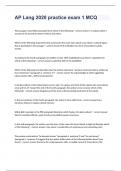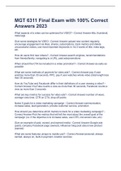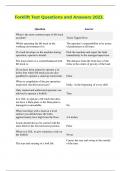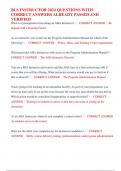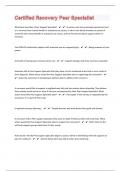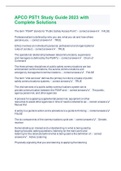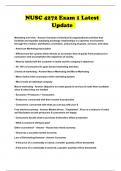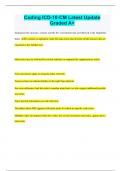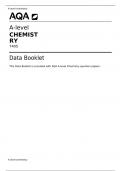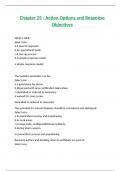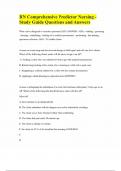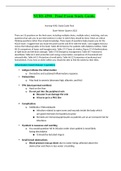CERTIFICATES OF DEPOSIT (CD)
A certificate of deposit (CD) is a product offered by banks and credit unions that
provides an interest rate premium in exchange for the customer agreeing to leave a
lump-sum deposit untouched for a predetermined period of time. - Answers -What is a
Certificate of Deposit (CD)
When the first CD matures in a year, you take the resulting funds and open a top-rate 5-
year CD. A year later, your initial 2-year CD will mature, and you'll invest those funds
into another 5-year CD. You continue doing this every year with whichever CD is
maturing, until you end up with a portfolio of five CDs all earning 5-year APYs, but with
one of them maturing every 12 months, keeping your money a bit more accessible than
if all of it were locked up for a full five years. - Answers -What to do once the first 1-year
CD has matured in a 5-year CD ladder
CD earnings are taxed at the time the bank applies them to your account, regardless of
when you withdraw your CD funds. The interest earned is reported as income when you
file your tax return. - Answers -How CD earnings are taxed
1. Roll over the CD into a new CD at that bank. Generally it would be into a CD that
most closely matches the term of your maturing CD. For example, if you have a 15-
month certificate concluding, they would likely roll your balance into a new 1-year CD.
2. Transfer the funds into another account at that bank. Options include a savings,
checking, or money market account.
3. Withdraw the proceeds. They can be transferred to an external bank account or
mailed to you in a paper check. - Answers -The three typical options given to you on the
date of maturity of a CD
You may lose out on potential higher returns. Shopping around for the best CD rates is
essential and it is unlikely that the bank you have your deposit in will have a top-end
rate by the time your CD matures. Even if it does, you can reinvest your money there
with confidence but if you have not done your homework, you could lose out on a higher
CD rate from another bank. - Answers -Why it is unwise to let your CD rollover
Some particularly onerous penalties exist in the marketplace, where a flat-percentage
penalty is applied. Since this percentage can outweigh what you've earned on a CD you
haven't kept very long, you could find yourself collecting less in proceeds than you
invested. As a result, these types of EWPs are best avoided. - Answers -The type of
Early Withdrawal Penalty (EWP) which is best avoided
These are sometimes called raise-your-rate certificates. Bump-up CDs offer savers a
chance to access a higher rate usually one time during their term. So if you open a 5-
year certificate and rates rise during that period, you'll have one opportunity to lock in at
, a higher rate currently offered by the bank, which will then apply for the duration of your
term. Occasionally, bump-up CDs will allow two rate increases, although only for long-
term CDs. - Answers -Bump-up CDs
Add-on CDs let you play around with your deposit amount, instead of your interest rate.
Here you can open the CD with one amount, but make additional deposits to increase
your invested principal. Some banks will allow as many add-ons as you like; others will
stipulate a certain number of allowable add-ons per time period (e.g., per month or
quarter), and a few will limit the add-ons to just one or two during the full term. -
Answers -Add-on CDs
These sound enticing, as they seem to provide the interest rate benefit of a certificate of
deposit, but with less risk should you need to cash out early. No-penalty CDs can
indeed bridge the gap between a fully accessible savings account and a CD with an
early withdrawal penalty. But as you can guess, "no penalty" comes with a price tag: a
lower interest rate than you would be able to earn with a traditional CD. So it's important
to compare the rates of no-penalty CDs with what you can earn from a top savings or
money market account. - Answers -No-penalty CDs
A lower interest rate than you would be able to earn with a traditional CD. - Answers -
The main disadvantage of a no-penalty CD
Certificates of deposit can also be a useful savings vehicle for retirement funds. Many
banks and credit unions offer IRA CDs. Some have a separate menu of CDs that are
available as IRAs, while other institutions allow any of their standard CDs to be set up
as IRA CDs. One difference in either case is that IRA CDs must be held in an officially
designated IRA account. - Answers -IRA (Individual Retirement Account) CDs
They offer lower rates
If you want to withdraw early it is much more complicated - Answers -Give at least one
disadvantage of getting a CD through a brokerage firm
A brokered CD is a bank CD but with the brokerage acting as a process-simplifying
middle man. The main advantage of this is the increase in convenience and simplicity to
opening and using the CD. - Answers -The main advantage of opening a brokered CD
Brokered CDs will be included on the same regular monthly or quarterly statements you
already get for your brokerage account, with all maturity dates and terms shown. This
makes tracking what you hold, and when each will mature, much simpler.
Opening a brokered CD is also a bit easier. As you already have an account with the
brokerage firm, it will acquire the CD on your behalf. This spares you the bank
paperwork of directly opening a CD and the extra statements you get afterward.
Termination is also simplified: When the CD matures, the funds will typically move into
your cash account at the brokerage firm. - Answers -Give at least one way in which
having a brokered CD is more convenient
A certificate of deposit (CD) is a product offered by banks and credit unions that
provides an interest rate premium in exchange for the customer agreeing to leave a
lump-sum deposit untouched for a predetermined period of time. - Answers -What is a
Certificate of Deposit (CD)
When the first CD matures in a year, you take the resulting funds and open a top-rate 5-
year CD. A year later, your initial 2-year CD will mature, and you'll invest those funds
into another 5-year CD. You continue doing this every year with whichever CD is
maturing, until you end up with a portfolio of five CDs all earning 5-year APYs, but with
one of them maturing every 12 months, keeping your money a bit more accessible than
if all of it were locked up for a full five years. - Answers -What to do once the first 1-year
CD has matured in a 5-year CD ladder
CD earnings are taxed at the time the bank applies them to your account, regardless of
when you withdraw your CD funds. The interest earned is reported as income when you
file your tax return. - Answers -How CD earnings are taxed
1. Roll over the CD into a new CD at that bank. Generally it would be into a CD that
most closely matches the term of your maturing CD. For example, if you have a 15-
month certificate concluding, they would likely roll your balance into a new 1-year CD.
2. Transfer the funds into another account at that bank. Options include a savings,
checking, or money market account.
3. Withdraw the proceeds. They can be transferred to an external bank account or
mailed to you in a paper check. - Answers -The three typical options given to you on the
date of maturity of a CD
You may lose out on potential higher returns. Shopping around for the best CD rates is
essential and it is unlikely that the bank you have your deposit in will have a top-end
rate by the time your CD matures. Even if it does, you can reinvest your money there
with confidence but if you have not done your homework, you could lose out on a higher
CD rate from another bank. - Answers -Why it is unwise to let your CD rollover
Some particularly onerous penalties exist in the marketplace, where a flat-percentage
penalty is applied. Since this percentage can outweigh what you've earned on a CD you
haven't kept very long, you could find yourself collecting less in proceeds than you
invested. As a result, these types of EWPs are best avoided. - Answers -The type of
Early Withdrawal Penalty (EWP) which is best avoided
These are sometimes called raise-your-rate certificates. Bump-up CDs offer savers a
chance to access a higher rate usually one time during their term. So if you open a 5-
year certificate and rates rise during that period, you'll have one opportunity to lock in at
, a higher rate currently offered by the bank, which will then apply for the duration of your
term. Occasionally, bump-up CDs will allow two rate increases, although only for long-
term CDs. - Answers -Bump-up CDs
Add-on CDs let you play around with your deposit amount, instead of your interest rate.
Here you can open the CD with one amount, but make additional deposits to increase
your invested principal. Some banks will allow as many add-ons as you like; others will
stipulate a certain number of allowable add-ons per time period (e.g., per month or
quarter), and a few will limit the add-ons to just one or two during the full term. -
Answers -Add-on CDs
These sound enticing, as they seem to provide the interest rate benefit of a certificate of
deposit, but with less risk should you need to cash out early. No-penalty CDs can
indeed bridge the gap between a fully accessible savings account and a CD with an
early withdrawal penalty. But as you can guess, "no penalty" comes with a price tag: a
lower interest rate than you would be able to earn with a traditional CD. So it's important
to compare the rates of no-penalty CDs with what you can earn from a top savings or
money market account. - Answers -No-penalty CDs
A lower interest rate than you would be able to earn with a traditional CD. - Answers -
The main disadvantage of a no-penalty CD
Certificates of deposit can also be a useful savings vehicle for retirement funds. Many
banks and credit unions offer IRA CDs. Some have a separate menu of CDs that are
available as IRAs, while other institutions allow any of their standard CDs to be set up
as IRA CDs. One difference in either case is that IRA CDs must be held in an officially
designated IRA account. - Answers -IRA (Individual Retirement Account) CDs
They offer lower rates
If you want to withdraw early it is much more complicated - Answers -Give at least one
disadvantage of getting a CD through a brokerage firm
A brokered CD is a bank CD but with the brokerage acting as a process-simplifying
middle man. The main advantage of this is the increase in convenience and simplicity to
opening and using the CD. - Answers -The main advantage of opening a brokered CD
Brokered CDs will be included on the same regular monthly or quarterly statements you
already get for your brokerage account, with all maturity dates and terms shown. This
makes tracking what you hold, and when each will mature, much simpler.
Opening a brokered CD is also a bit easier. As you already have an account with the
brokerage firm, it will acquire the CD on your behalf. This spares you the bank
paperwork of directly opening a CD and the extra statements you get afterward.
Termination is also simplified: When the CD matures, the funds will typically move into
your cash account at the brokerage firm. - Answers -Give at least one way in which
having a brokered CD is more convenient

